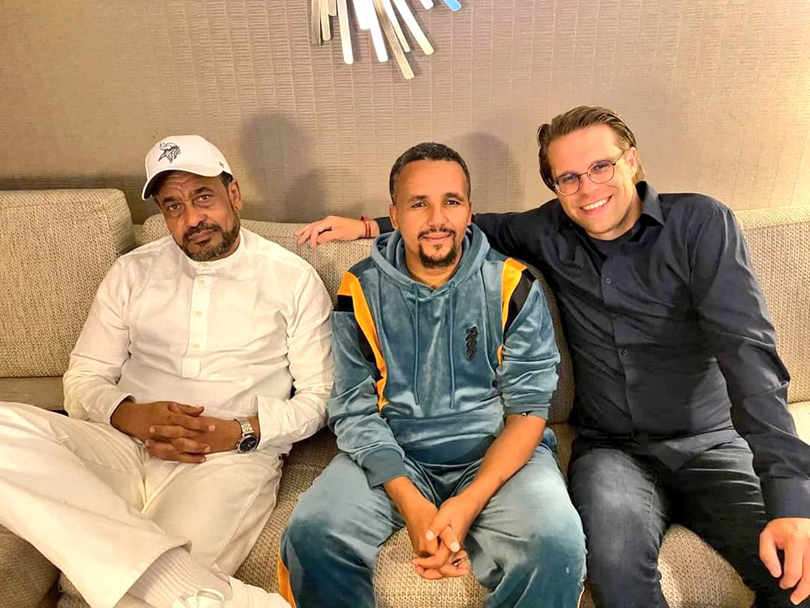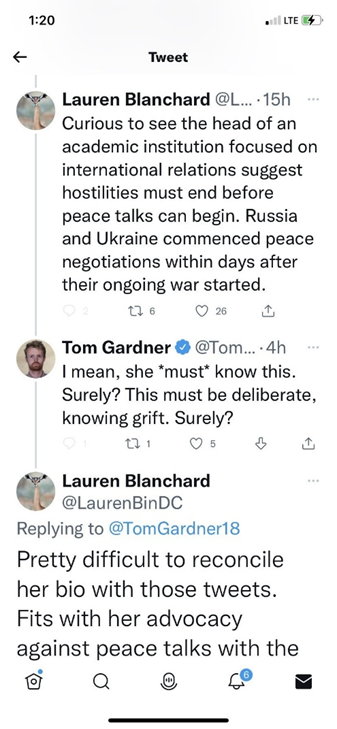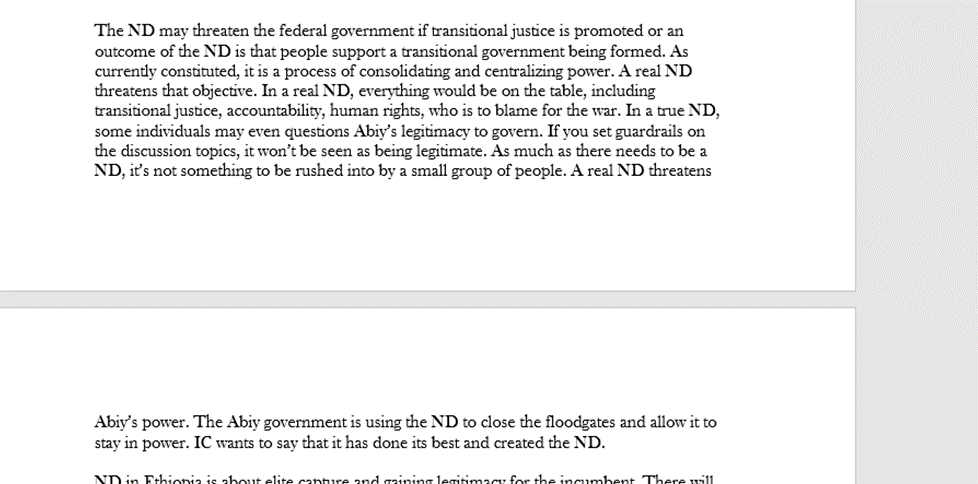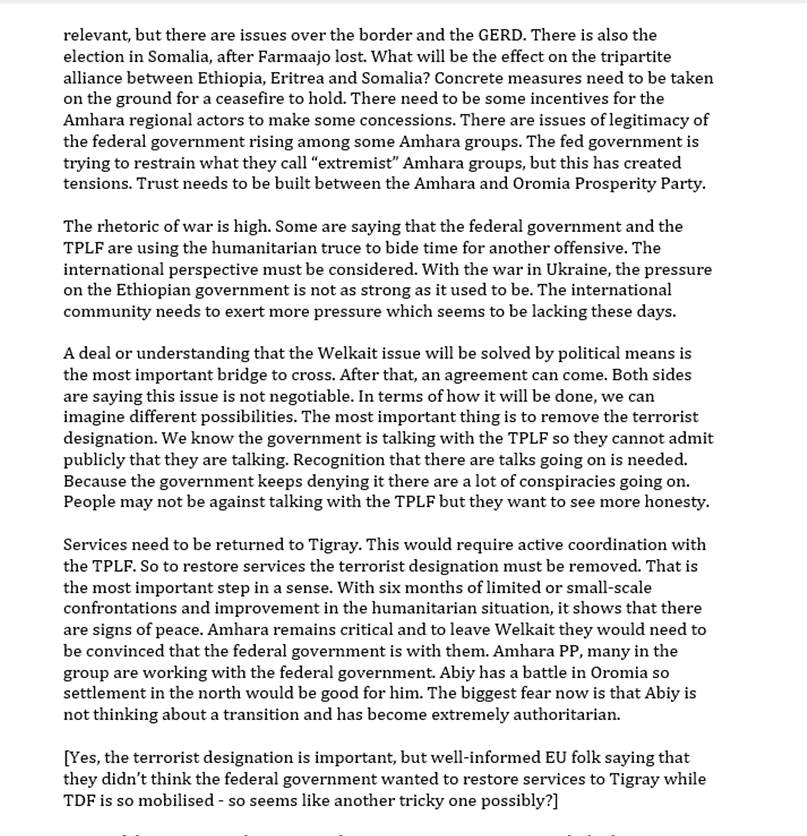Jeff Pearce
 Gather around, kids! And I’ll sing you a tune of how ol’ William Davison, senior analyst at Crisis Group, has organized a mutual support group to keep interfering in Ethiopian Affairs. This is despite his being deported twice from the country, and his pals having dubious qualifications over analyzing or commenting at all on the current conflict involving Tigray.
Gather around, kids! And I’ll sing you a tune of how ol’ William Davison, senior analyst at Crisis Group, has organized a mutual support group to keep interfering in Ethiopian Affairs. This is despite his being deported twice from the country, and his pals having dubious qualifications over analyzing or commenting at all on the current conflict involving Tigray.
He calls it the Ethiopia Peace Policy Forum, and at one point, it’s had at least forty members. Here is why it matters. Consider that one of them, the odious marginal academic based in Montreal, Patrick Wight — who likes to delete his more inflammatory tweets when caught out and who once posted a photo of the lavish house in Tigray belonging to his wife’s family — has gone out of his way to lend his name to petitions and attacks to get the Balsillie Institute’s Ann Fitz-Gerald fired. Wight just had an article published on Davison’s rag, Ethiopia Insight.
It includes this laughably ignorant gem: “The shifting alliances since 2018 are replicating a constant pattern in Ethiopian politics, one that is explained by the way the Ethiopian state was formed— by forcing together various nations — and the incomplete status of its nation-building project.”
Wight — who knows as much about Ethiopian history as I do about Armenian taxes on Wiffle balls— is clueless to the reality that the various peoples of the one nation collaborated and cooperated for centuries, and that one of those architects of forming a cohesive state was Yohannes IV… you know, a Tigrayan. Who, by the way, sanctioned the southern campaigns of Menelik. But then the whole point of Wight’s article — riddled with assertions while offering no factual foundation for them — is to continue Davison’s mission of sowing discord and to bring down the federal government. The same one that slammed the door shut (again) on his ever returning to Ethiopia. Go fetch, Patrick. And so he did. Good dog!
Another individual “interested” in the EPPF is Tom Gardner, who got kicked out of Ethiopia for his repeated unethical behavior. Still another is Andrew DeCort, a lecturer on religious studies and political ethics who is connected to a “love” website that I truly believe might give you diabetes if you read its nauseating copy too long.
An article by DeCort in Foreign Policy making questionable claims about Ethiopia’s religious climate in the past few years has earned derision online. Folks considering DeCort’s analysis might want to consider who he’s friendly with.

Other members include:
Michael Woldemariam, Director, African Studies Center, Pardee School of Global Studies, Boston University
Adem K. Abebe of Constitution Net
Emmanuel Yirdaw
Kisanet Haile Molla, who pushes Tigraihub, a website doing a soft sell on Tigray secession and peddling the TPLF narrative
Alemayehu Fentaw Weldemariam, regular contributor to Fungus Davison’s Ethiopia Insight
Samuel M. Gebru of Tufts University, base of Alex “Mango” de Waal, who once wrote it was okay to militarily target civilians who “protect terrorists”
Tobias Hagmann of Denmark’s Roskilde University
Jason Mosley, Associate Senior Researcher with SIPRI’s Conflict, Peace and Security area, Research Associate at the African Studies Centre, Oxford University and Managing Editor of the Journal of Eastern African Studies
Mehdi Labzaé, whose biased analysis of Welkait was endorsed by no less than Robbie Corey-Boulet when he was AFP’s correspondent in Ethiopia
Befeqadu Z. Hailu of the Center for Advancement of Rights and Democracy (CARD)
Nagessa Dube, now in Seattle but once the Deputy Attorney General at the Oromia Attorney General’s Office
There are others who initially wanted to stay anonymous “given the recent leak of the Peace and Development Center International online meeting” as Davison once put it.
I mention these names not to suggest those cited above necessarily agree or endorse any or all of the opinions of the others, but I would argue we have every right to question why you would associate with such individuals who have resorted to bullying academics, harassing female analysts through DMs, and who are trying to legitimize a terrorist group responsible for the slaughter of thousands of people (Wight openly supported the use of child soldiers when Finbarr O’Reilly’s New York Times photos sparked outrage).
All of this should be seen in the context that the sinister consultancy, Valent Projects, is trying to sell to its clients the rubbish that those of us who support Ethiopia are somehow all part of a devious web of “social coordination” — whatever the hell that is — and that we are all Russian assets, which is incredibly racist and insulting in particular to Ethiopians, implying that they cannot make up their own minds regarding their internal politics.
Now: Do some of us talk to each other? Yes. It should surprise no one that we do. Do we strategize? Yes, we sometimes do. And I will not apologize for that.
The difference between us and the Fungus Club is that we are not actively trying to destabilize a country.
If you want to see “coordination,” consider how Western media outlets have put up a monolithic wall against virtually every story or Op-Ed piece that contradicts the TPLF narrative, favoring comments again and again by Davison and publishing the views of Wight and DeCort, as well as articles by Tom Gardner of The Economist. Gardner barely bothers now to hide his regular visits to the Twitter feed of Lauren Blanchard, a congressional researcher in name only, who in reality presides as a pro-TPLF troll, attempting to slam to any published piece on Ethiopia that is grounded in fact-based research.

Oh, and Will, Tom, and Kjetil Tronvoll are also part of a “Tigray Signal Group” controlled by the TPLF’s digital network and that regularly has chats over the “Tigray crisis” (not, to be more accurate, the “Northern Ethiopia crisis”). Yes, a source has let me in on this, too.
In other words, there’s a hell of a lot of “social coordination” going on with William Davison and his clique to organize messaging and manufacture Western perspectives.
This can be seen as well through Davison’s emails. On November 26 last year, he told the group. “I spoke today to an Al Jazeera Inside Story producer about the latest show, which I felt was not particularly well composed: there was an interview with Minister of Democratization Zadig Abrha, and then a two-man panel of Martin Plaut and Tghat.com boss [and disinformation specialist] Gebrekirstos Gebreselassie.
“I said to the producer that I could compile a list of potential guests with different perspectives, so that they have a few different pools to choose from in order to give them a better chance of always achieving something relatively balanced.
So, if you could please let me know if you are interested in going on the show, or if you have suggestions for potential guests who you think would be constructive and insightful, then I will compile names in a document.”
Balance, remember, as Davison sees it. He feels confident enough about planting his own chosen mouthpieces on major media programs.
He and his clique are determined to affect the outcome of events and manipulate the narrative.
They can call it a “peace policy forum” all they like, but I seriously question why certain ferenji outsiders — who are not welcome anymore in the country they talk about — as well as prominent Ethiopian and diaspora types are working with the aim of supporting terrorist groups and giving them equal legitimacy.
Here, for instance, is one of their ideas that we might see lobbed out as a grenade soon to lure media attention. This, from Davison’s email account:
“Many thanks everyone for a great discussion, and particularly to Patrick for taking notes and sending them so quickly!
Andrew [DeCort] has been inspired by the meeting and will be in touch with a few of you to discuss the idea of developing something along the lines of an Ethiopian Kairos Document. That’s exactly the type of activity we hoped would result from the EPPF. Please reach out to him if you’d like to learn more [email address].”
What really leaps off the page from their meeting notes is an attitude that persists in seeing Ethiopians in Balkanized ethnic groups. The notes offered here were written up by Patrick Wight, whose prose is like Nytol and about as biased as you would expect. He rattles off “The Tigrayan perspective, the Somali perspective, the Oromo perspective, the Amhara perspective…”
There is no appreciation that political nuances and evolving attitudes may arise from and belong to individuals — only their ethnicities. For instance, “The Tigrayan perspective sees this process [national dialogue] as a joke of the highest order. Practically, Tigray is not included so far in terms of stopping the war, allowing aid in.”
This, according to who, exactly? The TPLF? Is that the “Tigrayan perspective?”
Some other highlights from the notes of their recent meetings: Here’s another excerpt, for example, from Wight’s notes on their February 11 meeting about National Dialogue:
“The ND may threaten the federal government if transitional justice is promoted or an outcome of the ND is that people support a transitional government being formed. As currently constituted, it is a process of consolidating and centralizing power. A real ND threatens that objective. In a real ND, everything would be on the table, including transitional justice, accountability, human rights, who is to blame for the war. In a true ND, some individuals may even questions Abiy’s legitimacy to govern. If you set guardrails on the discussion topics, it won’t be seen as being legitimate. As much as there needs to be a ND, it’s not something to be rushed into by a small group of people. A real ND threatens Abiy’s power. The Abiy government is using the ND to close the floodgates and allow it to stay in power. IC wants to say that it has done its best and created the ND.”

There can be no dispute that this is openly hostile to the elected government of Ethiopia. Now it’s perfectly all right to criticize the government of Ethiopia… If you’re Ethiopian. If you live there. If you have — excuse the expression — skin in the game.
But this is ad hoc group that includes prominent ferenji, including ones booted out of the country, deciding they don’t like the process and are trying to undermine it.
This point is very clear from their notes, and it’s worth pointing out that even Wight falls into the habit of referring to the region throughout a note summary for May 23 by its proper name, Welkait, in what seems to be a sign that even he knows the bullshit narrative of “Western Tigray” isn’t valid. What really should capture our attention, however, is this shameless assertion: “The most important thing is to remove the terrorist designation.”
“We know the government is talking with the TPLF,” writes Wight, “so they cannot admit publicly that they are talking. Recognition that there are talks going on is needed.” Oh, really? You know this for a fact, do you? How? Especially since stories to that effect have been debunked more than once.

I fully expect that once they see this story, Fungus Davison and his circle will rush to close the leaks and move their meeting, in the same manner that the “retired” diplomats scurried in a panic to do damage control and keep on plotting with TPLF reps.
What is crucially important — what should be the key takeaway for anyone reading this — is that you have another secretive group with impressive reach and influence over the media and who are not citizens of that African country colluding to influence its events and even affect whether the nation stays whole in the future.
This is and should be unacceptable. It is quite true that I have met and consulted online and on the phone with everyone from Simo Parviainen to Alastair Thompson to Sheba Tekeste to others. I don’t give a shit who knows, and I doubt they do either. It’s pretty obvious that likeminded people will retweet or help amplify views agreed with.
But not one of our conversations — ever — have involved or been designed to come up with a parallel policy framework to substitute for the one being implemented by an African state!
Nor is anyone out to get a terrorist organization delisted.
Nor are any of us trying to manipulate coverage — we should be so lucky if anyone even manages to get an appearance on TV or interviewed by a news site.
Fungus Davison will no doubt bleat that what they’re doing is mere “analysis,” a talking shop to promote “solutions” for peace. Funny how all their main players keep steering the conversation back to what’s good for the TPLF or what helps keep Ethiopia divided along ethnic lines.
Peace, as the old appeasers discovered quite a while ago, cannot come at any price. And it sure as hell shouldn’t be cooked up by guys kicked out of the very country being discussed.
They are the very definition of neo-colonialism. Time to break up their club.
